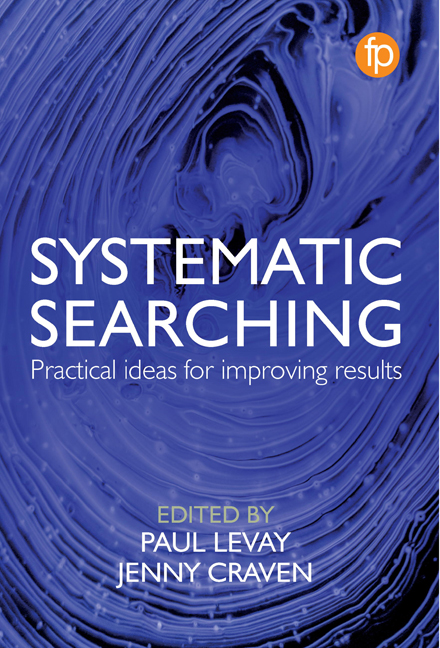Book contents
- Frontmatter
- Contents
- Figures, tables and case studies
- Contributors
- Acknowledgements
- Abbreviations
- Foreword
- 1 Introduction: where are we now?
- 2 Innovative approaches to systematic reviewing
- 3 Searching for broad-based topics
- 4 Choosing the right databases and search techniques
- 5 Gathering evidence from grey literature and unpublished data
- 6 Social media as a source of evidence
- 7 Text mining for information specialists
- 8 Using linked data for evidence synthesis
- 9 Evidence surveillance to keep up to date with new research
- 10 Training the next generation of information specialists
- 11 Collaborative working to improve searching
- 12 Communication for information specialists
- 13 The information specialist as an expert searcher
- 14 Conclusion: where do we go from here?
- Glossary
- Index
3 - Searching for broad-based topics
Published online by Cambridge University Press: 08 June 2019
- Frontmatter
- Contents
- Figures, tables and case studies
- Contributors
- Acknowledgements
- Abbreviations
- Foreword
- 1 Introduction: where are we now?
- 2 Innovative approaches to systematic reviewing
- 3 Searching for broad-based topics
- 4 Choosing the right databases and search techniques
- 5 Gathering evidence from grey literature and unpublished data
- 6 Social media as a source of evidence
- 7 Text mining for information specialists
- 8 Using linked data for evidence synthesis
- 9 Evidence surveillance to keep up to date with new research
- 10 Training the next generation of information specialists
- 11 Collaborative working to improve searching
- 12 Communication for information specialists
- 13 The information specialist as an expert searcher
- 14 Conclusion: where do we go from here?
- Glossary
- Index
Summary
Introduction
A range of research is often required to address a specific research need. This chapter draws on examples of systematic searches used for systematic reviews that inform public policy decisions. Systematic reviews used to inform public policy are driven by practice needs, rather than neatly centred on discrete areas of research. Literature searches for these reviews are often required to capture samples of research studies that both span across a variety of topics and research fields and provide sufficient depth of research for each topic area (Francis et al., 2015; Oliver, Dickson and Bangpan, 2015).
This research might cross a range of subject domains, use a variety of approaches to address similar issues, or be described by diverse terminology. The diversity and fragmentation of the relevant literature poses challenges for literature searching using a systematic approach and this may affect our confidence that the studies collected are representative of the research that exists. There is no clear uniform solution to finding information in broad research fields such as public health (Bayliss Davenport and Pennant, 2014; Levay, Raynor and Tuvey, 2015).
At its heart, a manageable search strategy requires careful choices of where and how to locate research. This chapter is relevant to anyone supporting or undertaking systematic literature searches and other stakeholders involved in undertaking or using systematic reviews. It focuses on key aspects in planning a literature search for a broad-based topic, highlights challenges and provides examples of various approaches. This chapter closely relates to Chapter 2, on innovative and iterative approaches to systematic searching, and Chapter 4 on choosing the right sources and techniques. A discussion of broad-based topics is followed by examples of how different approaches have been used.
Overview of the topic
Systematic searching involves applying a clear rationale to seek out the best available evidence to address a research question. It aims to obtain research that is either a comprehensive collection or a representative sample of the available evidence (Brunton et al., 2017, 96-98). In practice, it is impossible to know the total universe of relevant studies and search strategies are unlikely to retrieve every relevant reference (Brettle et al., 1998; Brunton et al., 2017, 98). We introduce our own biases as to which resources we decide to search and how we search them.
Information
- Type
- Chapter
- Information
- Systematic SearchingPractical ideas for improving results, pp. 51 - 72Publisher: FacetPrint publication year: 2018
Accessibility standard: Unknown
Why this information is here
This section outlines the accessibility features of this content - including support for screen readers, full keyboard navigation and high-contrast display options. This may not be relevant for you.Accessibility Information
- 2
- Cited by
